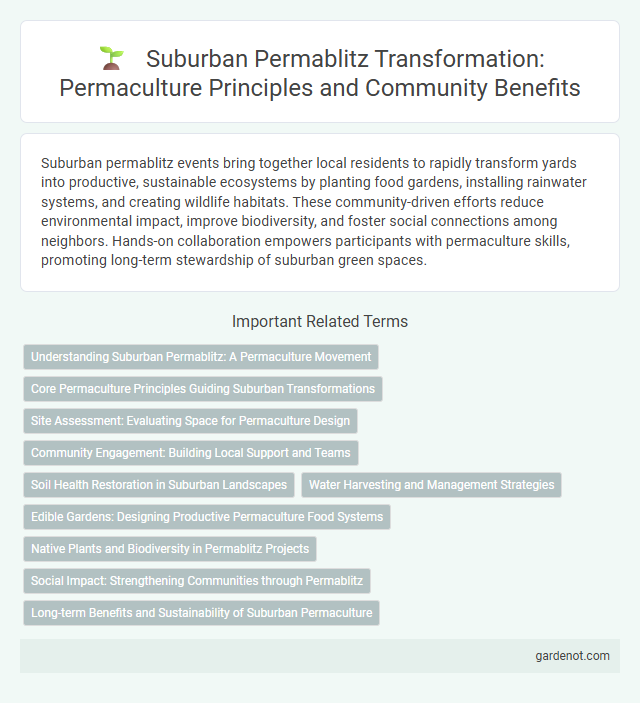Suburban permablitz events bring together local residents to rapidly transform yards into productive, sustainable ecosystems by planting food gardens, installing rainwater systems, and creating wildlife habitats. These community-driven efforts reduce environmental impact, improve biodiversity, and foster social connections among neighbors. Hands-on collaboration empowers participants with permaculture skills, promoting long-term stewardship of suburban green spaces.
Understanding Suburban Permablitz: A Permaculture Movement
Suburban Permablitz embodies a community-driven permaculture movement where neighbors collaboratively design and implement sustainable gardens in suburban areas. This grassroots initiative promotes biodiversity, water conservation, and organic food production by transforming underutilized suburban spaces into productive ecosystems. Emphasizing shared knowledge and collective action, Suburban Permablitz fosters environmental stewardship and strengthens local resilience against climate challenges.
Core Permaculture Principles Guiding Suburban Transformations
Core permaculture principles guiding suburban permablitz projects include observing and interacting with the environment to create sustainable, regenerative spaces that optimize water use, soil health, and biodiversity. Emphasis is placed on designing systems that mimic natural ecosystems, such as integrating food forests, rainwater harvesting, and composting to reduce waste and enhance productivity. These principles foster community collaboration and resilience, transforming suburban landscapes into productive, ecologically balanced habitats.
Site Assessment: Evaluating Space for Permaculture Design
Site assessment in suburban permablitz involves analyzing soil quality, sunlight exposure, and existing vegetation to optimize permaculture design. Evaluating water drainage patterns and microclimates ensures efficient resource use and plant placement. Accurate space measurement and mapping support sustainable planting strategies and help integrate diverse plant guilds effectively.
Community Engagement: Building Local Support and Teams
Suburban permablitz events foster community engagement by assembling diverse local teams to collaboratively design and implement sustainable permaculture projects. These initiatives cultivate neighborhood support through hands-on workshops, skill-sharing, and collective problem-solving, strengthening social bonds while promoting environmental stewardship. Active participation in permablitz activities enhances local knowledge of regenerative practices, encouraging ongoing commitment to resilient urban ecosystems.
Soil Health Restoration in Suburban Landscapes
Suburban permablitz events target soil health restoration by revitalizing compacted, nutrient-poor soils through organic mulching, compost application, and cover cropping techniques. These interventions boost microbial activity, enhance water retention, and improve soil structure, fostering resilient suburban ecosystems. Integrating native plants and diverse organic matter supports long-term soil fertility and biodiversity in residential landscapes.
Water Harvesting and Management Strategies
Suburban permablitz projects emphasize water harvesting techniques such as rainwater tanks, swales, and contour trenches to maximize capture and infiltration on limited urban land. Efficient water management strategies include greywater recycling, mulching, and selecting drought-tolerant native plants to reduce irrigation needs. These sustainable practices enhance groundwater recharge, mitigate urban runoff, and promote resilient, low-maintenance landscapes.
Edible Gardens: Designing Productive Permaculture Food Systems
Suburban permablitz events focus on creating edible gardens that maximize yields through permaculture principles, employing companion planting, vertical gardening, and water-efficient techniques. These designs integrate native plants and nutrient cycling to build resilient, low-maintenance ecosystems suited for limited urban spaces. Emphasizing soil health and biodiversity supports sustainable food production and local food security in suburban environments.
Native Plants and Biodiversity in Permablitz Projects
Suburban permablitz projects prioritize the integration of native plants to enhance biodiversity and create resilient ecosystems within urban landscapes. Incorporating indigenous species supports local wildlife, improves soil health, and reduces the need for synthetic inputs. These permaculture designs foster sustainable habitats that contribute to ecological balance and community awareness of environmental stewardship.
Social Impact: Strengthening Communities through Permablitz
Suburban permablitz events foster strong community bonds by engaging diverse neighbors in collaborative gardening projects that enhance local sustainability. These hands-on workshops promote knowledge sharing, environmental stewardship, and social cohesion, creating resilient urban ecosystems. Participants build lasting relationships while collectively transforming suburban spaces into productive, green hubs that support food security and reduce ecological footprints.
Long-term Benefits and Sustainability of Suburban Permaculture
Suburban permablitz events foster community collaboration to implement sustainable permaculture designs that enhance biodiversity and improve soil health over time. These initiatives increase local food security by promoting resilient, low-maintenance landscapes that conserve water and reduce carbon footprints. Long-term benefits include stronger urban ecosystems, reduced reliance on external resources, and a healthier environment for future generations.
Suburban permablitz Infographic

 gardenot.com
gardenot.com